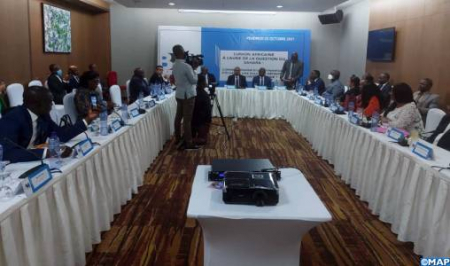African Experts Underline Need to Expel So-called ‘Sadr’ from AU
African experts, including politicians, academics, economists and representatives of the private sector, members of Think Tanks and eminent members of civil society, stressed on Friday in Kinshasa that the expulsion of the so-called ‘Sadr’ from the African Union (AU) is imperative in that it will constitute “an institutional breakthrough in the service of African unity”. Gathered in the Congolese capital on the occasion of a seminar organized by the Public Affairs Cabinet (BM Patners), under the theme “The African Union in the light of the Sahara issue: how to move from a dynamic failure to a final solution serving African unity “, the participants stressed that the artificial conflict over the Moroccan Sahara continues to undermine Africa’s stability, peace and security, as well as its economic, sub-regional and continental integration. Taking the example of the blockade created by the “Polisario” militias in Guerguerat, in October-November 2020, the speakers stigmatized this “act of piracy” as a violation of the 1991 ceasefire; a violation also noted by the Secretary General of the United Nations in his last Report on the Sahara, says a report by the organizers. This act, adds the same source, constitutes a tangible brake on economic integration, a cause of disruption of health and food supply chains in the pandemic context (Covid-19), an obstacle to the free movement of people and goods throughout the sub-region, and therefore a threat to the implementation of the African Continental Free Trade Area (AfCFTA). While highlighting the multidimensional role of Morocco on the Continent, even before its reintegration into the AU, in 2017, a role that aligns with the objectives of Agenda 2063 as well as with the vision of a reinvigorated, uninhibited and assumed Pan-Africanism, supported by all African States, the personalities present wondered about the added value of “Sadr” since its admission, both on issues of economic integration, but also on other strategic subjects, crucial themes and sectoral meetings of the AU. The speakers also examined the solutions available to the African Union to regain its impartiality on the issue of the Moroccan Sahara while insisting on the particular circumstances characterizing the admission of the “Sadr” within the OAU, circumstances which were recognized by the motion of Kigali, signed in 2016 by 28 AU member states. This motion further correlated Morocco’s reintegration into the African Union with the suspension of the “Sadr” from its ranks. Insisting on the content of decision 693, taken on the occasion of the Nouakchott Summit of July 2018, which enshrined the exclusive role of the United Nations Security Council in the treatment of the Sahara issue, the experts invited African States and the AU to go beyond these achievements and show more pragmatism, while calling for examining the path of the expulsion of the “sadr” as a necessity in order to consolidate the unity of the continent and protect it from divisions linked to growing separatist threats. They also insisted on the need for the Pan-African organization to follow the path of the majority of African States and international community, and all regional and multilateral organizations, including the United Nations, by no longer recognizing the “Sadr” as a member and therefore expelling him from its ranks. The participants also discussed the Moroccan autonomy proposal, considered as the “just, credible, sincere political solution based on compromise”. This “peaceful solution” makes it possible to negotiate an autonomous status for the Sahara region, based on inclusiveness, on respect for the cultural specificities of the populations and constitutes a bulwark against terrorism and secessionism, a real scourge threatening the stability of the Sahelo-Saharan region. The exchanges made during this seminar made it possible to demonstrate, on the basis of the “sacredness of historical facts”, the sovereignty of Morocco over its Sahara, an integral part of its territory, its history and the construction of its Nation as well as of its plural identity.

